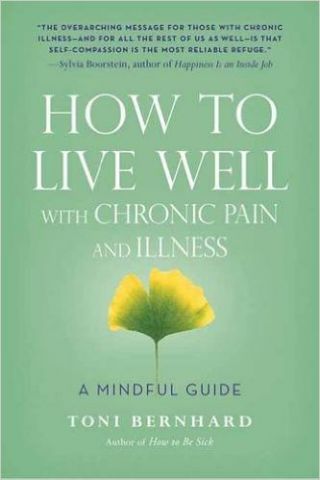Chronic Pain
How to Live Well: A Book Review
Being kind to yourself is the best medicine.
Posted September 27, 2015
How to Live Well with Chronic Pain and Illness: A Mindul Guide is the book I wish I'd had when I began my journey with chronic pain ten years ago. It's practical, reassuring, and written by someone who's traveled the journey.

Toni Bernhard is a best-selling and award-winning writer of How to Be Sick and How to Wake Up. She also writes a popular blog on Psychology Today, Turning Straw Into Gold. Her readers adore her, as evidenced by her over 200,000 fans on Facebook. Previously a law professor, Toni became ill in 2001 while on a trip to Paris and has never recovered her health. Experiencing chronic flu-like symptoms and often being bed-bound hasn't stopped her from leaving a full and rich life.
As Toni writes in her introduction, How to Live Well is "one dose stark reality, one dose practical skills, and one dose humor.” Her books are inspired by her 25 years of Buddhist study and practice, but like well-known Western dharma teachers such as Sharon Salzberg and Tara Brach, she explains these concepts in a relatable way. As she wrote in her first book, she considers the Buddha not to be a god, but the greatest psychologist of all time. You definitely don’t have to be Buddhist or know anything about it to benefit from this book. In fact, How to Live Well focuses less on Buddhism per se and more on mindfulness and other proven cognitive practices.
Each of the chapters is relatively short, and can stand alone. You can dip in and out of the book depending on your needs. For people with chronic pain and illness, who sometimes have short attention spans (like me) this is a great feature.
I always like reading the Table of Contents before I buy a book. Here are the major sections in How to Live Well, with each section having anywhere from three to nine short chapters.
I. Skills to Help with Each Day
II. Mindfulness: Potent Medicine for Easing the Symptoms of Chronic Illness
III. Responding Wisely to Troubling Thoughts and Emotions
IV. Special Challenges (includes topics such as sleep, uncertainty, dealing with doctors, relationships with caregivers, and young people with chronic illness)
V. Isolation and Loneliness
VI. Enjoy the life you have
VII. For Family, Friends, Caregivers, and Anyone Concerned about Chronic Illness
VIII. Last but Not Least (Including Toni’s “true confessions” and heartfelt wishes for her readers)
I’ve learned so much from Toni, but probably the single most important thing is the life-changing practice of being kind to myself. In a previous interview with her, she said:
“I look at it this way. We control so little in our lives, but the one thing we can control is how we treat ourselves. I see no reason for us not to be as kind and gentle with ourselves as we can be. It’s not our fault that we have health problems. We’re in bodies and they get sick and injured. It will happen to everyone. This is how it’s happen to us.”
In her warm and wonderful way, Toni reminds us in her new book that “being kind to yourself is the best medicine.”
Find all versions of the book on Amazon.
Also check out Toni's latest blog post, 20 Tips for Living Well with Chronic Pain and Illness.
You can find me on Facebook.
You might like one of my most popular posts, 80+ Self-Care Ideas.


